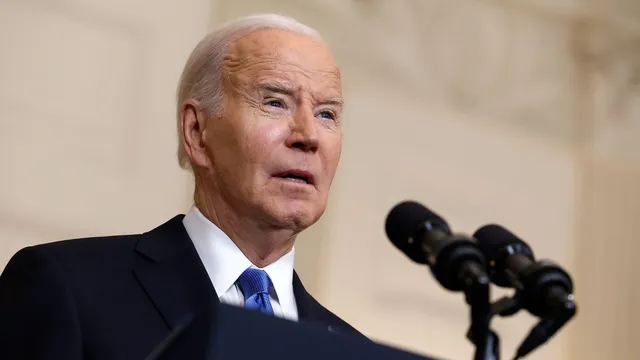President Joe Biden is facing an unexpected challenge in Michigan’s Democratic primary, and it’s not coming from his nominal opponent, Rep. Dean Phillips of Minnesota. Instead, it’s coming from an unlikely source: “Uncommitted.”
Frustrated by Biden’s perceived inaction in securing a lasting cease-fire in Gaza, discontented Democrats in Michigan are urging fellow party members to register their protest by choosing the “uncommitted” option in Tuesday’s primary rather than voting for the incumbent president.
While organizers don’t anticipate this tactic will deny Biden a victory in the primary, they hope that a significant number of “uncommitted” votes will send a clear message to the administration, urging it to use its influence to rein in the Israeli military.
A robust showing of “uncommitted” voters would signal a setback for Biden, underscoring the strain the conflict has placed on the Democratic coalition in a crucial swing state like Michigan.
Marshall Clabeaux, 30, expressed his distress over the situation in Gaza, stating, “You’re seeing just horrifying images and reports of civilians being murdered.” Clabeaux, who successfully proposed a resolution for a cease-fire at a county committee meeting, emphasized the need for Biden to change course on Gaza to avoid alienating a significant portion of Michigan’s electorate.
The emergence of the “uncommitted” movement in Michigan has injected an unconventional element into the primary race. With competing campaigns employing different strategies to engage Democratic voters, Biden’s campaign has taken a more traditional approach, focusing on high-profile surrogates, canvassing, and phone banking to secure a solid victory.

Biden (Credits: BNN Breaking)
Meanwhile, the “uncommitted” forces are employing grassroots tactics to channel the discontent within the party. Groups, like Listen to Michigan have organized phone banks in multiple languages to reach a diverse range of voters. Additionally, student-led initiatives, such as a march to polling places to cast “uncommitted” votes, are gaining traction.
If the “uncommitted” vote surpasses the 15% threshold in Michigan’s congressional districts, it could result in delegates at the national convention in August not being pledged to Biden. Depending on the size of the “uncommitted” bloc, these delegates could influence policy changes or throw support behind alternative candidates.
The objective of the “uncommitted” movement is to send a message to Biden, with leaders aiming for a significant number of votes comparable to Trump’s victory margin in Michigan in 2016.
However, the growing “uncommitted” vote poses a challenge for Biden, particularly as polls suggest a tight race against Trump in the general election. While acknowledging the passions behind the movement, Democratic leaders like Governor Gretchen Whitmer caution against fracturing the party and the potential consequences of diverting votes away from Biden.
Despite efforts by the Biden administration to address concerns over its stance on the Gaza conflict, frustrations persist among Michigan Democrats. The vetoing of a cease-fire resolution at the United Nations Security Council and limited reassurances from senior administration officials have fueled discontent within the party.
Surrogates like Rep. Ro Khanna have attempted to explain Biden’s position and engage with critics, but the challenge remains significant as progressive voices within the Democratic coalition continue to voice their concerns.
In the face of mounting pressure, Biden’s ability to navigate internal divisions within the Democratic Party while maintaining electoral support in key states like Michigan remains a critical test for his presidency.























